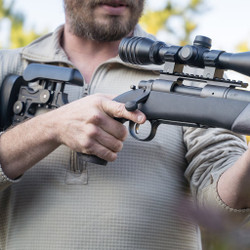Most precision shooters will know that a quality, sturdy chassis will help with consistency and accuracy. A rigid chassis will have much less flex and roll when you are shooting from different positions, and a cheaper stock will. They can also flex and torque the barrel to one side or the other, as well as hit the barrel in a free-float setup which can cause inconsistencies. While a different stock material will not necessarily increase accuracy, it does increase the strength and rigidity which, in turn, increases consistency. Delivering consistent shots is the key to the best possible accuracy, and rifle positioning is also a major factor. By having a consistent cheek weld, adjusting the rifle to fit yourself perfectly, an action that will not move inside of the chassis, and a free-floated barrel, you can achieve the most consistent shots on target every time.
With all that being said, what is the right material for a chassis? WOOX insists that aircraft-grade aluminum is far superior to anything else. There’s a reason that companies such as Ford and Ferrari, as well as the aircraft industry, use this quality metal. The most advanced industries and high spec requirements use aircraft-grade aluminum, so why not the shooting industry as well?
In its current lineup, WOOX offers aluminum in several different forms. It’s multi-material technology, so stocks such as the Furiosa, Exactus, and Wildman stocks use aluminum castings, extrusions, and stamped sheet metal of different alloys and heat treatments. All of these pieces are fastened together through a combination of welding, rivets, and sheet metal screws. WOOX has developed a state of the art process to form and shape aircraft-grade aluminum, as well as the castings that serve as the focal point of the structure which are smaller. Much of the current bonding is also supplemented with screws or rivets in a belt-and-suspenders case to ensure the interface’s integrity. This was not done because of the builder’s lack of faith in the glue, but rather because of the fact that glued joints are vulnerable to peeling forces that might eventually separate one part from another while shooting.
The aerospace industry has been using this technology for years, and it is finally time to bring the precision shooting industry up to speed. Carbon is typically a lot lighter and less harsh, but an alloy is much more robust and offers many more advantages.Many of the carbon fiber materials and techniques that are used for production in modern shooting chassis will actually negate the theoretical advantages fo the material, as stated by the engineers of the technological department named WOOX LAB. The main issue lies in the carbon fiber manufacturing process. The hand layups produce the lightest and strongest parts but are so labor and time intensive that the results are incredibly expensive. An alternative is an automated method, where a slurry of carbon fibers and resin is injected into a mold. This automated process increases the weight of the carbon fiber to the point where the material loses its weight advantage over aluminum. There are so many more advantages to a stock or chassis in aircraft-grade aluminum than the often overpriced carbon fiver.
We highly recommend upgrading if you have the money. It will easily solve the frustration that many have with a standard stock, or even more expensive “high quality” stocks on the market today.
Once you place any WOOX product in your hands, you will instantly see and feel the difference!

